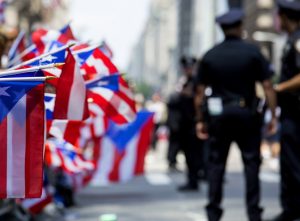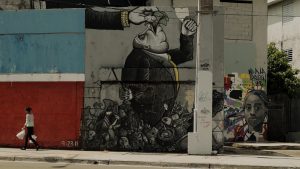
The June 2016 national annual Puerto Rican Day Parade celebration in New York City occurred amidst legal and economic developments that are cause more for mourning than celebration. Facing an unprecedented fiscal and humanitarian crisis, Puerto Rico and its people have been dealt a series of legal blows – denying the island and its people any say in addressing the crisis and reinforcing a history of subordination and exploitation by the United States of America.
The United States Supreme Court dealt a double blow to Puerto Rico in a pair of cases.
In the first, Puerto Rico v. Sanchez Valle, issued on June 9, the Court held that Puerto Rico is not a separate sovereign for purposes of double jeopardy. This is because, notwithstanding Puerto Rico’s Constitution and laws, its power to prosecute derives not from its people, but from the United States Congress. Though arising in the double jeopardy context, this decision about sovereignty reinforces Puerto Rico’s subordinated status vis a vis the United States. The Court’s decision in Sanchez Valle maintains a colonial vision of Puerto Rico. In ruling as it did, the Court passed up an opportunity to disavow the incoherent and unjust legal basis for Puerto Rico’s subordinated relationship to the United States as articulated in the infamous Insular cases of the early 1900s. Those cases created a category, “unincorporated territories”, including Puerto Rico, that belong to but are not part of the United States and over which the U.S. Congress exercises plenary powers. The subsequent establishment of the Puerto Rico Constitution in 1952 supported a notion of local self-rule in Puerto Rico. Puerto Rico’s local governance structures and laws contributed to its sovereign identity.
Yet in the Sanchez Valle opinion, Puerto Rico is denied recognition of very basic components of domestic governance and self-rule. Notwithstanding a ratified Constitution conferring local self-rule in Puerto Rico, the opinion declines to recognize Puerto Rico’s sovereignty with respect to the power to prosecute those who have committed gun crimes in Puerto Rico under its own gun laws. In addressing whether the double jeopardy restriction applies to a prosecution brought by Puerto Rico for criminal acts prosecuted under U. S. federal laws, the opinion “considers, as it must, the question of Puerto Rico’s sovereignty.” Justice Kagan writes for the majority that “sovereignty in this context does not bear its ordinary meaning.” Thus, sovereignty for Puerto Rico does not mean sovereignty as most United States citizens would understand it – as including the authority to govern itself and to prosecute according to its criminal laws, including its gun control laws. Instead, for purposes of determining whether double jeopardy applies, “sovereignty” depends on history – a history of subordination.
The opinion is all the more dismaying in its rationale that dual sovereignty does not apply because “the oldest roots of Puerto Rico’s power to prosecute lie in federal soil.” This odd truncation of Puerto Rico’s history is used to support an argument that is inconsistent with the treatment of “new” States, Indian Tribes, and several other United States territories regarding sovereignty and double jeopardy, as Justice Breyer points out in dissent. The majority cites the “unique political relationship” between the United States and Puerto Rico and says that the dual sovereignty test for double jeopardy focuses “not on the fact of self-rule but on where it came from.” This internally inconsistent statement reads more like a parade of nonsense words than a statement of the U.S. Supreme Court.
In the second opinion, rendered on June 13, one day after the parade, the Court further impaired Puerto Rico’s prospects for local self-rule, determining that Puerto Rico is precluded from re-structuring its municipalities’ debt. In Puerto Rico v. Franklin Calif. Tax-Free Trust, the Court held that the United States Bankruptcy Code pre-empts Puerto Rico’s bankruptcy law, the Recovery Act, while at the same time excluding Puerto Rico from accessing the U.S. Bankruptcy Code to resolve its crushing debt crisis.
The decision affirmed a reading of the U.S. Bankruptcy Code that prevents Puerto Rico from attempting to resolve its debt crisis in an organized and responsible manner. The debt crisis has placed a severe strain on essential services including the provision of electricity, water, police protection, and has resulted in the closure of hospitals, schools and the loss of other essential services. The Puerto Rico Recovery Act proposed to restructure the debt of essential government-owned public utilities, aqueduct and sewer, electric power and highways and transportation so that essential public services could continue. This effort was challenged by investment funds that held bonds issued by the electric power authority, and other utilities that wanted no limits on their demands for payment regardless of the consequences.
Applying cramped, narrow rules of statutory interpretation that ignore the overarching structure and purpose of the Bankruptcy Code, the majority, in an opinion by Justice Thomas, determined that Congress intended to exclude Puerto Rico from the ability to access the Bankruptcy Code as a debtor while simultaneously pre-empting Puerto Rico from engaging in bankruptcy reorganization under its own Recovery Act. This means that Puerto Rico is denied the ability to address the crisis either under its Recovery Act or under U.S. bankruptcy law. The Court’s reading of the Act puts Puerto Rico in the untenable position of having no mechanism with which to address its debt crisis in an orderly fashion. Its only recourse lies with Congress, which for months and years failed to act to protect the island from the dire consequences of an ongoing fiscal and humanitarian crisis. At the core of this crisis is the long term exploitative and dysfunctional legal and political relationship between the United States and Puerto Rico which has prevented the island from establishing a sustainable economic infrastructure.
A better reading of the Act and a better outcome for Puerto Rico is articulated in the dissenting opinion by Justice Sotomayor. Sotomayor states that consistent with the bankruptcy law’s structure, context, and purpose, Puerto Rico is not pre-empted from enacting its own municipal bankruptcy law – the Recovery Act. Providing a lucid explanation of the bankruptcy code’s structure, Sotomayor notes that none of Chapter 9’s provisions, including the pre-emption provision apply to Puerto Rico and its municipalities because Puerto Rico is excluded in the law’s gateway provision. She urges that “statutes should not easily be read as removing the power of a government to protect its citizens.” Yet denial of Puerto Rico’s power to protect its citizens is the result here.
The remedy, the Court says, lies with Congress and indeed, a week before the opinion was issued, the United States House of Representatives passed a debt relief bill (bearing the acronym PROMESA) that would impose a fiscal control board on Puerto Rico, with no input from the Puerto Rican people. Many observers believe that some form of this bill will be passed into law.
Congress’s proposed PROMESA bill raises concerns about further denial of Puerto Rico’s sovereignty and self-determination. There are also fears that the interests of wealthy hedge fund managers and corporations will continue to be valued far more than the lives of more than 3 million human beings whose health and well-being hang in the balance. Most depressing perhaps is how blithely both the Court and several members of Congress mask these developments through a myopic, technocratic application of law that fails to give adequate attention to context, consequences, or justice.
If Puerto Rico’s self-rule depends on Congress as expressed by the Court and effected under the current PROMESA bill, then it is not self-rule at all. To the extent that Puerto Rico’s fate lies in the hands of the current United States Congress, there remains significant cause for concern in light of the Court’s decisions and Congress’s approach thus far.
On the immediate question of Puerto Rico’s fiscal and humanitarian crisis, Congress must ensure that any fiscal control board include representation of and protections for the Puerto Rican people. Given the degree to which hedge funds (including aptly named “vulture funds”) have had a hand in taking advantage of and seeking to profit from Puerto Rico’s fiscal and political bind, there is little faith that either humanitarian concerns or interests in the long term health of the island will hold sway. Many believe that a fiscal control board controlled by a Congress reliant on contributions from wealthy hedge funds will only continue to privilege private profit-taking over the desperate human needs of the Puerto Rican people and the need for sustai nable support of the island’s fiscal, economic, and public infrastructure.
nable support of the island’s fiscal, economic, and public infrastructure.
There must be careful oversight of the PROMESA bill’s provisions and their application to ensure that Puerto Rico does not suffer further harm. Already, too many hospitals and schools have closed, too many people – including those who could most contribute to the island’s economy – have left Puerto Rico. The island’s infrastructure – from electricity, water, and roads to the police force and social services — is under tremendous strain. Congress must act quickly and responsibly to address this crisis by prioritizing the interests of Puerto Rico’s citizens. Puerto Ricans on the U.S. mainland, along with all Americans concerned about this and other humanitarian crises sparked by extreme and growing wealth inequality coupled with the effects of U.S. colonialism and subordination must organize and act to urge members of Congress to implement a resolution that protects the people of Puerto Rico and safeguards the island’s sovereignty.
For the parade of horribles experienced by Puerto Rico to turn a positive corner, the current disaster must be used as an opportunity, once and for all, to acknowledge that the “unique political relationship” between the United States and Puerto Rico is an unjust and exploitative relationship that must be changed. That change starts by having Congress address the current crisis in a manner worthy of the United States’ claims of liberty, equality, and justice.


